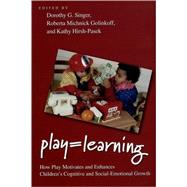
Note: Supplemental materials are not guaranteed with Rental or Used book purchases.
Purchase Benefits
What is included with this book?
| Contributors | p. xi |
| Why Play = Learning: A Challenge for Parents and Educators | p. 3 |
| Challenges to Play | |
| The Cognitive Child Versus the Whole Child: Lessons from 40 Years of Head Start | p. 15 |
| The Role of Recess in Primary School | p. 36 |
| School Readiness-School Standards | |
| Standards, Science, and the Role of Play in Early Literacy Education | p. 57 |
| Make-Believe Play: Wellspring for Development of Self-Regulation | p. 74 |
| My Magic Story Car: Video-Based Play Intervention to Strengthen Emergent Literacy of At-Risk Preschoolers | p. 101 |
| Narrative Play and Emergent Literacy: Storytelling and Story-Acting Meet Journal Writing | p. 124 |
| Mathematical Play and Playful Mathematics: A Guide for Early Education | p. 145 |
| Media and Computers | |
| Media Use by Infants and Toddlers: A Potential for Play | p. 169 |
| Computer as Paintbrush: Technology, Play, and the Creative Society | p. 192 |
| Play With Dysfunctional Children | |
| Pretend Play and Emotion Learning in Traumatized Mothers and Children | p. 209 |
| Play and Autism: Facilitating Symbolic Understanding | p. 231 |
| Epilogue: Learning to Play and Learning Through Play | p. 251 |
| Index | p. 263 |
| Table of Contents provided by Ingram. All Rights Reserved. |
The New copy of this book will include any supplemental materials advertised. Please check the title of the book to determine if it should include any access cards, study guides, lab manuals, CDs, etc.
The Used, Rental and eBook copies of this book are not guaranteed to include any supplemental materials. Typically, only the book itself is included. This is true even if the title states it includes any access cards, study guides, lab manuals, CDs, etc.